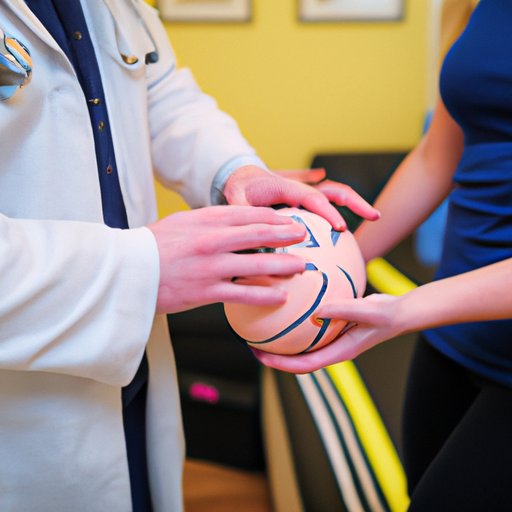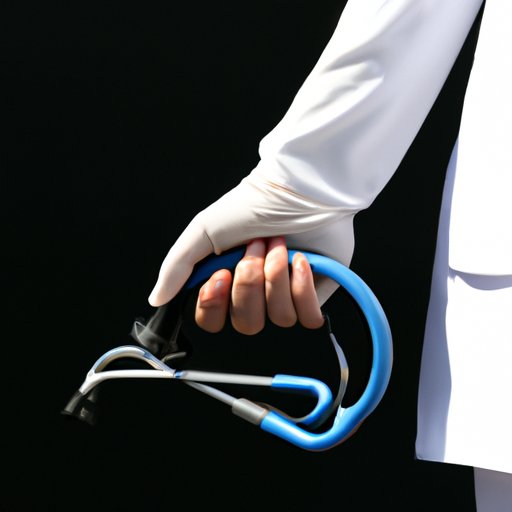
Introduction
Sports medicine physicians play a vital role in the world of athletics, with their primary focus on preventative care, injury treatment, and maximizing athletic performance. These specialized healthcare providers have the skills and knowledge necessary to support athletes of all levels, from professional competitors to weekend warriors. In this guide, we’ll explore the world of sports medicine and uncover the critical role that sports medicine physicians play in athletic care.
The Ultimate Guide to Understanding the Role of a Sports Medicine Physician
Sports medicine physicians are healthcare providers who specialize in the diagnosis and treatment of injuries and illnesses related to sports and exercise. They collaborate with patients, coaches, trainers, and other members of the healthcare team to develop treatment plans that help athletes maximize their physical potential and minimize the risk of injury.
Sports medicine physicians receive specialized training in the areas of primary care sports medicine, musculoskeletal medicine, and orthopedics. They utilize their skills to treat a wide range of injuries, including acute injuries such as sprains, strains, and fractures, as well as chronic conditions such as overuse injuries and arthritis.
Some of the specific tasks and responsibilities of sports medicine physicians include:
– Conducting pre-participation physical exams to ensure athletes are healthy enough to compete safely
– Developing personalized treatment plans for athletes dealing with injuries or illnesses
– Collaborating with other members of the healthcare team to provide comprehensive care
– Performing diagnostic tests, such as X-rays and MRIs, to identify issues that may be impacting an athlete’s performance or causing pain
– Prescribing medications, including pain medication and antibiotics, when appropriate
– Providing rehabilitation services, such as physical therapy and occupational therapy, to help athletes recover from injuries and regain strength and flexibility

The Vital Importance of Sports Medicine Physicians in Athletic Care
Injuries are a common occurrence in the world of sports, and they can have a significant impact on an athlete’s physical health, emotional well-being, and ability to compete. Sports medicine physicians play a crucial role in preventing and treating these injuries, helping athletes avoid long-term damage and get back on their feet as quickly as possible.
In addition to treating injuries, sports medicine physicians also work to maximize athletic performance. They work closely with athletes, coaches, and trainers to develop training plans that are safe and effective, taking into account the athlete’s unique needs, physical abilities, and sport-specific demands. By working closely with the entire healthcare team, sports medicine physicians can help athletes achieve their full potential and compete at the highest level possible.
There are countless examples of athletes who have benefited from sports medicine care, from Olympic champions to weekend warriors. Some notable examples include:
– Kobe Bryant, who underwent a cutting-edge procedure to repair his torn Achilles tendon and was able to return to the court and continue his career
– Lindsey Vonn, who received treatment for numerous knee and back injuries, allowing her to compete at the highest level in multiple Olympic Games
– Tiger Woods, who received treatment for multiple back injuries, including a spinal fusion surgery that helped him return to the top of the golf world
Exploring the Education and Training Requirements of Sports Medicine Physicians
Becoming a sports medicine physician requires extensive education and training. Most sports medicine physicians begin with a four-year undergraduate degree in a science-related field, followed by four years of medical school. After completing medical school, they must complete a residency in family medicine, internal medicine, or another related field.
Once they have completed residency, aspiring sports medicine physicians must complete a fellowship in primary care sports medicine. This fellowship typically lasts for one year and provides specialized training in the diagnosis and treatment of sports-related injuries and illnesses.
The education and training requirements for sports medicine physicians are different from those required for orthopedic surgeons. While both types of healthcare providers treat musculoskeletal injuries, orthopedic surgeons receive more advanced and specialized training in surgery. For patients who require surgical interventions, an orthopedic surgeon may be a better choice of specialist.
It’s critical for sports medicine physicians to stay up-to-date with new developments in the field. This requires ongoing continuing education and professional development opportunities, such as attending conferences or participating in research studies.
Interview with a Sports Medicine Physician: What Does a Typical Day Look Like?
To get a better understanding of what it’s like to work as a sports medicine physician, we spoke with Dr. John Kim, a board-certified sports medicine physician who practices in Los Angeles, California.
Dr. Kim shared that a typical day on the job varies depending on the season and the patients he is seeing. During the off-season, he may spend more time conducting pre-participation physical exams or developing injury prevention plans for athletes. During the season, he may spend more time treating acute injuries and working with athletes to manage their pain and maximize their physical performance.
One of the biggest challenges faced by sports medicine physicians is the high-pressure environment in which they work. Athletes are often highly competitive and driven, which can place a significant amount of pressure on healthcare providers to get them back to peak condition as quickly as possible. However, Dr. Kim emphasized that it’s crucial to balance this pressure with an emphasis on comprehensive care that helps athletes recover safely and effectively.
Sports Medicine Physician vs. Orthopedic Surgeon: Understanding the Differences
While sports medicine physicians and orthopedic surgeons both treat musculoskeletal injuries, there are significant differences between the two types of healthcare providers.
Sports medicine physicians are focused on the non-surgical treatment of sports-related injuries and illnesses. They use a variety of techniques, such as physical therapy, medication, and rehabilitation services, to help athletes recover from injuries and regain strength and mobility. They may also perform minimally invasive procedures, such as injections or arthroscopy, when appropriate.
Orthopedic surgeons, on the other hand, are focused on surgical interventions for musculoskeletal injuries. They are trained to perform a wide range of surgical procedures, including bone surgery, joint replacement, and arthroscopic surgery. Orthopedic surgeons are typically consulted when non-surgical interventions have proven ineffective or if a patient’s injuries require advanced surgical care.
For patients dealing with sports-related injuries, it’s important to know when to visit a sports medicine physician vs. an orthopedic surgeon. In general, sports medicine physicians are the ideal choice for non-surgical interventions or for managing the recovery process after a surgical procedure. Orthopedic surgeons are typically reserved for cases that require advanced surgical interventions.
How Sports Medicine Physicians Keep Athletes Healthy Throughout the Season
Keeping athletes healthy throughout the season requires a comprehensive approach that involves collaboration with coaches, trainers, and other healthcare providers. Sports medicine physicians employ numerous strategies to prevent injuries and maximize athletic performance, including:
– Conducting pre-season physical exams to identify potential issues before they become injuries
– Developing injury prevention plans that address each athlete’s unique needs and demands
– Providing nutritional guidance to help athletes fuel their bodies effectively
– Developing safe and effective training plans that improve overall fitness and prevent overuse injuries
– Monitoring athletes throughout the season for signs of injury or illness and intervening when necessary
– Providing rehabilitation services, such as physical therapy, to help athletes recover from injuries and regain strength and mobility
Top 5 Qualities of a Successful Sports Medicine Physician
Sports medicine physicians who excel in their field possess a set of specific qualities that help them succeed. Some of the top qualities of successful sports medicine physicians include:
1. In-depth knowledge of sports-related injuries and illnesses, including the latest treatments and technologies
2. Strong communication skills that help them collaborate effectively with patients, coaches, trainers, and other members of the healthcare team
3. Empathy and compassion, which allow them to build strong relationships with their patients and provide compassionate care
4. Attention to detail, which helps them make accurate diagnoses and develop effective treatment plans
5. A commitment to ongoing learning and professional development, which allows them to stay up-to-date with new developments in the field
Of course, there are many other skills and qualities that can contribute to success as a sports medicine physician. However, possessing these top qualities can help healthcare providers excel in this specialized and highly demanding field.
Conclusion
Sports medicine physicians play a critical role in athletic care, providing injury prevention, treatment, and performance optimization services to athletes of all levels. These dedicated healthcare providers possess a unique set of skills, including specialized knowledge of sports-related injuries and illnesses, strong communication and teamwork skills, and a commitment to ongoing learning and professional development.
If you’re dealing with a sports-related injury or illness, a sports medicine physician can help. By collaborating with patients, coaches, trainers, and other members of the healthcare team, sports medicine physicians provide comprehensive care that helps athletes get back on their feet and return to the sports they love.




